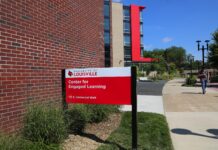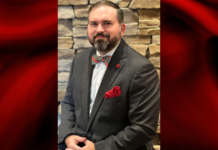The four-year-old program, which offers a free college education to Kentucky students whose families live at or below 150 percent of the federal poverty level, is the first of its kind in Kentucky. More than 320 students are enrolled in Cardinal Covenant, and 27 are expected to graduate this spring and summer.
Its first graduate, Nicole Watkins, graduated in only three years.
Murray, Ky., physician and UofL trustees Robert Hughes told the students at Wednesday night’s event that he, too, came from financial hardship as he grew up in Prestonsburg, Ky. He added that their backgrounds enable the Cardinal Covenant students “to be more sensitive to those with similar backgrounds and needs.”
“You are in the early phases of a life of learning that will enable you to gain the knowledge and self confidence to walk with kings and presidents yet maintain the sensitivity to those less fortunate,” he said. “This is what makes a society greater. A wise father once said ‘When you can walk with kings and cry with the poor, my son, you are a man indeed.’
“It has been the hopes and dreams of every generation that their children will do better than them and have a better life,” Hughes added. “The value that this degree brings to you, your family now and for generations to come, and society as a whole is priceless.”
Cardinal Covenant students praised the program for opening doors to college and a better life.
“Without Cardinal Covenant, I don’t know if I even would have been here,” said Kyrstin Johnson. “Not only did Cardinal Covenant enhance my financial aid, but also allowed me to do things — join a sorority — I wouldn’t have been able to do otherwise.”
“College really wasn’t on my radar,” added Jonathan Hughes, who said UofL admissions officers approached him about taking advantage of Cardinal Covenant. “Without them, I wouldn’t be here.”
Hughes is now anticipating going to graduate school and building a career in higher education.
UofL President James Ramsey quoted former trustee Woodford R. Porter, who called education “the great equalizer.”
“We want to make sure that everyone who’s willing to do the work and do what’s required has the opportunity to get a quality education,” he added.
































